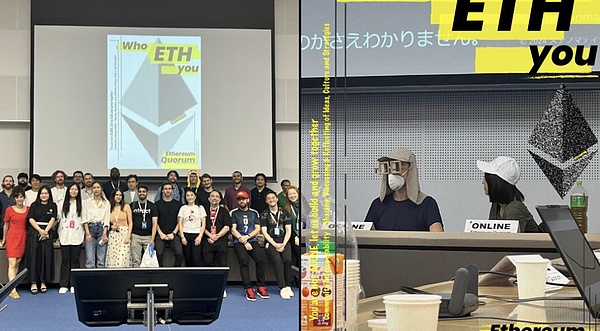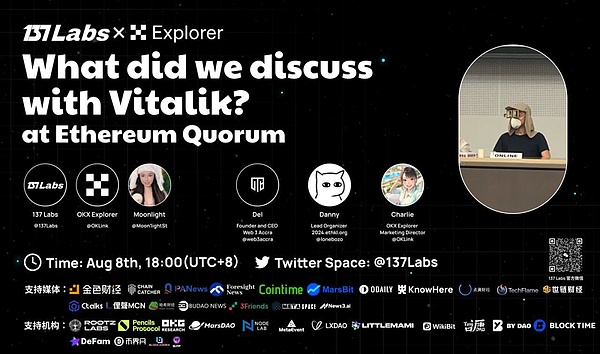The just concluded Tokyo EDCON conference brought together the most influential speakers, mentors and project parties from all over the world to share their insights and visions.
The event was held at the National Stadium and the United Nations University in Shibuya, Tokyo from July 24 to July 30. The conference discussed several key topics in the development of the Ethereum ecosystem and global blockchain, covering a wide range of discussions and panel meetings. Ethereum co-founder Vitalik Buterin delivered a keynote speech on the future development of Ethereum and the challenges of global standardization of Ethereum Layer 2.

Among them, Ethereum Quorum was held at the United Nations University on July 28, which was a vibrant closed-door forum with 24 global representatives attending to focus on discussing the future of the Ethereum ecosystem. This session aims to spark in-depth conversations about key issues facing the ETH ecosystem and explore collaborative solutions that can shape the future of Ethereum.

August 8, 18:00 (UTC+8)137Labs jointly with OKLink, invited representatives from Africa and Asia who participated in the closed-door meeting, as well as representatives from OKLink, to conduct a SPACE sharing of Ethereum Quorum-related content. This was also the first public sharing of the content of this closed-door meeting, and SPACE received 20K+ listens.The following is the text content:
PART 1
Introduction to the sharing guests
The first guest is Charlie from OKLink, who is responsible for marketing and brand promotion. Charlie talked about her experience participating in the EDCON event in Tokyo, where she interacted with key figures in the Ethereum ecosystem. She also shared insights on OKLink, a multi-chain blockchain data platform that supports 44 public blockchains and has been integrated into the OKX Web3 product suite. This platform provides comprehensive tools for end users, developers and enterprises, such as the OKX wallet, DEX, NFT market and DeFi, and is now further enhanced by the addition of a multi-chain explorer.
The second guest is Danny from ETHKL Malaysia, the largest developer blockchain community in Malaysia. ETHKL has been active since 2018 and has organized more than 170 meetups, case studies and workshops. It will hold the ETHKL 2024 conference and hackathon event at the Petronas Twin Towers in Malaysia from October 4 to 6.
The third guest is Del Titus Bawuah from Africa, the founder of Web 3 Accra (W3A). W3A is a Ghana-based community that works to bring together local communities, regulators, and international entities like OKX to legitimize the blockchain and cryptocurrency industry across Africa. W3A holds quarterly conferences and last year they had the honor of having Vitalik as a keynote speaker, which also led to the establishment of working groups with central banks and securities commissions to develop local policies for blockchain and cryptocurrency. Their ultimate goal is to create a thriving, secure, and open crypto and blockchain market for the region. Del represented the African perspective at the Ethereum Summit, sharing solutions with 24 other global participants.
PART 2
What key points or insights did you share during the conference?
Charlie
Charlie highlighted several key contributions and had deep interactions with developers during the conference. Charlie proposed OKLink to become the first official browser of Polygon AggLayer, and discussed AggLayer developed by Polygon Labs, a neutral protocol that solves the fragmentation problem often mentioned by the Ethereum community by leveraging zk-rollups and CDK to create a seamless cross-chain experience. They also mentioned the importance of transaction security for retail users and the necessity of reliable tools like blockchain browsers to mitigate risks, especially for novice users.
Charlie emphasized the challenges of guiding new users into Web3, pointing out that high barriers and complex terminology often discourage potential users. They emphasized the need for better education and user-friendly tools to bridge the gap between original and new Web3 users. Charlie used their blockchain browser service as an example to explain how even seemingly simple tasks can feel overwhelming for new users due to the complexity of data and terminology. Overall, Charlie's contributions focused on making Web3 more accessible and understandable to a wider audience.
Charlie also highlighted the importance of the African market, noting that Nigeria alone is one of the countries with the most users on their platform, surpassing many European countries. Charlie acknowledged the challenges Africa faces in promoting decentralized ideas through centralized systems and respected their efforts, noting the potential for blockchain to have a significant impact on the real economy if successful.
Danny
Danny shared important insights on creating a balanced Web3 ecosystem during the session. He used ETHKL, the largest developer-focused blockchain community in Malaysia, as a case study to highlight the need for diverse talent and resources. Danny pointed out that while Malaysia has a strong developer base, it lacks sufficient attention from entrepreneurs, incubators, and the government. To address this, ETHKL focuses on hosting hackathons and advocating for policies that promote development. Danny emphasized that a sustainable ecosystem requires a balance between investors, entrepreneurs, and a supportive legal framework, which is essential for long-term success. Danny also added that Ethereum plays a key role in solving the problem of entering the global economy, especially in regions like Africa. He mentioned that access to the global economy is often difficult in Africa through traditional banks, and Ethereum offers an important alternative.
Del Titus Bawuah
Del Titus Bawuah discussed the unique challenges and opportunities facing decentralized infrastructure in Africa during the session. He highlighted the contrast between active trading and a "grey" regulatory environment, emphasizing the importance of infrastructure and policy. Del pointed out that because cryptocurrencies and blockchain are seen as necessities in Africa, and due to the region's large young population and growing internet penetration, there are significant economic opportunities. He specifically pointed to the use cases of NFTs, such as land litigation and intellectual property protection, and emphasized the need for global decentralization to include emerging markets like Africa to ensure broad accessibility and success of Web3 development.
PART 3 Introduce your project and outline its future development plans
Charlie
Charlie introduced their project, a multi-chain blockchain explorer that serves end users, developers, and enterprises. For end users, the tool supports cross-chain transaction verification, address tracking, and asset management. Developers can use powerful APIs for contract verification, debugging, and comprehensive data. Recently, they launched the "Explorer as a Service" (EaaS) project, which enables public chains to have customized explorers for free, simplifying the development and maintenance process. This innovation supports the needs of enterprises by reducing costs and simplifying data management.
Charlie also emphasized the importance of the community in the Web3 ecosystem, pointing out that this is a core difference from Web2. She mentioned that while Web2's communities tend to be isolated and driven by value propositions, Web3 promotes open collaboration and exchange of ideas. Charlie stressed the importance of face-to-face interactions at events, which are often difficult to achieve through online platforms. She also pointed out the enthusiasm of developers and the resource gaps they face, emphasizing the role of Web3 collaboration in filling these gaps. Additionally, Charlie compared Danny’s work to another speaker’s efforts to transform African economies through similar open-source Web3 ecosystems, highlighting the potential of blockchain technology in solving endemic challenges such as corruption and financial inclusion.
Danny
Danny shared that ETHKL will continue to focus on its role as a community-driven meetup organization. With the support of new partners such as Manta Network, Scroll, and potentially OKX, they plan to address gaps in the Malaysian Web3 ecosystem. Future plans include leveraging these partnerships to enhance initiatives, expand impact, and promote collaboration across blockchains. Danny also stressed the importance of these initiatives in helping developers focus on their projects, while support services like the OKX Free Browser streamline their development process.
PART 4What do you think about the future development of Ethereum, including the Dencun upgrade and the recent ETF approval?
Charlie
Analyze from a data-driven perspective. Charlie observed that although the Dencun upgrade led to lower Layer 2 transaction fees and higher TPS, the overall Ethereum ecosystem did not see the expected growth. The momentum of Layer 2 solutions remained relatively flat, while individual projects such as Base and Arbitrum performed well. Charlie attributed this situation to the problem of liquidity fragmentation in Ethereum and the broader crypto ecosystem and the lack of truly innovative applications. She emphasized that although there have been developments such as re-staking in DeFi, these are more evolved versions of existing frameworks rather than breakthrough innovations. This has led to an overcrowding in the Web3 application field, making it difficult for users to choose the right options. She also pointed out that although Layer 2 transactions have become more active, the overall transaction volume has not increased significantly and has returned to pre-upgrade levels after an initial increase. Charlie believes that this stagnation is mainly due to limited growth in broader applications, a lack of real-world applications, and insufficient education and communication with new users. To address these challenges, she suggested that Ethereum could expand the influence of the ecosystem by working with Web2 entities or large financial institutions to create applications that resonate with a wider audience.
Regarding ETFs, Charlie believes that the Ethereum ETF is a positive signal for the ecosystem and reflects the interest of institutions. However, she pointed out that this may also be a double-edged sword. On the one hand, this indicates more liquidity brought by growth and traditional financial institutions; on the other hand, it also means that these institutions control a large amount of Ethereum assets, which may lead to selling pressure similar to Mt. Gox or the German government incident. Despite these concerns, Charlie believes that in the long run, ETFs will have a positive impact on the Ethereum ecosystem and its liquidity.
Danny
Danny said that although the EIP 4844 upgrade is designed to improve the scalability and security of Ethereum, its impact on actual applications is not significant. He stressed the importance of creating awareness among Web2 businesses and industries, which can be achieved by combining blockchain with traditional industries. Danny is actively promoting this by discussing collaborations with other Web2 companies such as the PETRONAS payment system to showcase the potential of blockchain. Regarding the recent ETF approval, Danny believes that this is a positive development for institutional investment in Ethereum, which may drive growth and adoption. However, he pointed out that the actual impact remains uncertain and will depend on how these developments are utilized in the Web3 space.
PART 5Are there any other updates or information you would like to share?
Charlie
Charlie advises individual users to use a blockchain explorer and ensure sufficient research to protect themselves when conducting transactions and investments. Additionally, she announced that by the end of August, their Explorer-as-a-Service(EaaS) project will launch six to eight new blockchain explorers, covering multiple chains including BTC Layer 2, EVM Layer 1, and Ethereum Layer 2. She is very excited about these upcoming new features and upgrades.
Danny
Danny encouraged the audience in Southeast Asia to attend their event in October. He emphasized that the event will bring together Web3 companies and is also open to any interested Web2 businesses. Developers and interested participants can check out the link in his profile for more details.
 WenJun
WenJun
 WenJun
WenJun WenJun
WenJun Xu Lin
Xu Lin Jixu
Jixu Bitcoinist
Bitcoinist Coinlive
Coinlive  Beincrypto
Beincrypto Coinlive
Coinlive  Globenewswire
Globenewswire Others
Others